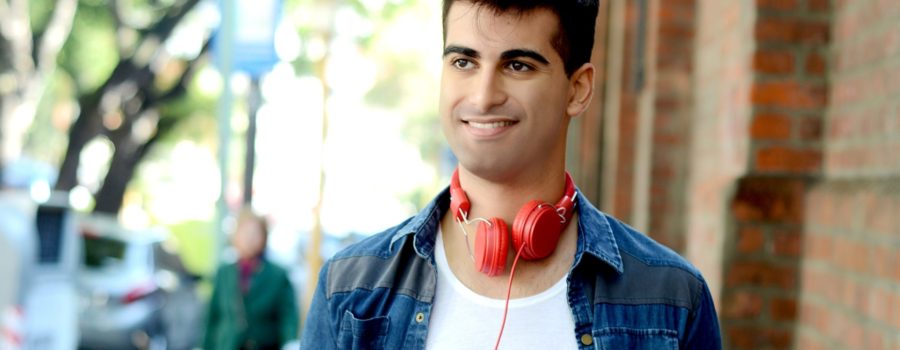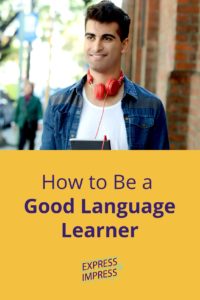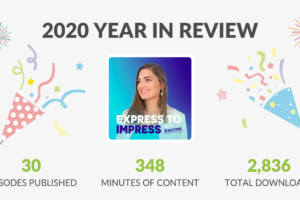Introduction
Hello! It’s Kristine here with the Express to Impress podcast. I’m really excited about our topic today. We’re going to talk about how to be a good language learner.
Can’t read now? Pin it for later!
I also want to take a moment to point out that my podcast is entirely ad-free. I aspire to produce episodes that I would like to listen to – something informative, inspiring, enjoyable, and to the point. While I will listen to podcasts with ads, I fast forward through advertisements and suspect many other people do too. So, I’m taking a different approach with my podcast. I invite my listeners to donate to the podcast when they can. So if you get a new job or a raise in part because of something you learned on the podcast, that would be the perfect time to make a donation. 100% of any amount you give will go to production expenses. You can donate with a debit card, credit card, or Paypal account on my website at express-to-impress.com/podcast.
And a quick reminder that you can subscribe to receive notifications whenever I release a new episode. You can subscribe on Apple Podcasts and all other major podcast directories.
Now, let’s begin!
Why Learning How to Be a Good Language Learner Matters
I believe everyone can be a good language learner, but not everyone knows what they need to do to be a good language learner. Of course, some people have advantages that help them learn another language. Perhaps they are fast learners or have had more exposure to the language. But some people have a leg up with language learning, and it has nothing to do with their natural ability to learn a language. I suspect it is the people who are not naturally inclined to learn another language who develop some of the best language learning habits. Even if you are a committed language learner, if you don’t have good learning approaches or habits, your progress will be slow. So, I will teach you how to be a good language learner.
Many people have pondered the question of what makes a good language learner. In 1975, scientist Joan Rubin researched the topic and found that anyone can become a good language learner. While I’ll give you many tips you can implement in your life immediately in this episode, if you have time, I recommend reading Rubin’s 10-page article, “What the Good Language Learner Can Teach Us,” published in TESOL Quarterly.
Story
I have met so many amazing language learners, but I will tell you about a Japanese doctor that I worked with to prepare for medical residency interviews in the US. As usual, I will change identifying details to protect the person’s identity.
This doctor only received one interview invitation, yet decided to invest a lot of effort to prepare for the opportunity of a lifetime.
I explained that her answers needed to be concise, just 30 to 90 seconds. Coming from a high-context culture, this was not easy. But, she was committed to speaking English clearly and concisely so that she could connect with her interviewers from a low-context culture. As a quick side note, if you want a refresher about low-context and high-context cultures and how it affects communication patterns, check out the episode, “How to Answer Interview Questions Without Rambling.”
Alright, back to the story. I noticed three learning skills and habits that made the doctor a great language learner. Let’s look at those skills and habits closely.
First, she made a substantial time and financial investment to improve her communication skills before her interview. She met with me 18 times over three months to focus on interview preparation and met with English language teachers. She only had one interview invitation initially, but she ended up having five interviews. Instead of settling for just one interview, she proactively wrote to additional programs to express her interest and highlight her strengths. And before sending each email, she asked me to review it for accuracy and clarity. Talk about going above and beyond!
The second thing I noticed was that she was an excellent listener and note-taker. After every mock answer, I gave her feedback on grammar, pronunciation, and clarity. She wrote the corrected version of a word or phrase in our Skype chat for easy future reference. For example, if I told her the stress on the word “responsible” was on the “o,” she would write the word “responsible” and capitalize the “o.” While it’s possible to translate those types of errors into written reminders for future reference, it’s hard to capture how someone says something. Specifically, it’s hard to capture a person’s volume of voice, emphasis, and enthusiasm. I modeled those things in our sessions, so she also recorded most of our lessons. When she revisited our training sessions, she analyzed herself speaking in English and observed how I expressed her answers.
The third thing I noticed was that she asked me many questions. Before beginning a mock interview, she often asked a few questions and asked more questions during the session. She sought out my guidance and was receptive to it.
As a result of those three learning habits, her answers transformed from wordy and lengthy to concise statements followed by a pause and a more in-depth explanation. Most of her answers were under 60 seconds. She spoke in a more organized manner, including numbers in her speech to help the listener follow along. She corrected many of her pronunciation and grammar mistakes. I saw an amazing transformation of the doctor’s speaking abilities because of her strong learning habits and dedication.
So, how does the story end? After each interview, she wrote to tell me she had a great interview. It was such a positive experience and could be life-changing. I’m waiting anxiously for the match results to come out in March.
How to Be a Good Language Learner
Now, let’s look at some tips for being a good language learner. In the episode, “How to Learn a New Language,” I said it’s best to have many motivations for learning another language. Identifying your reasons for learning a language is incredibly important and a necessary first step to being a good language learner. I won’t revisit possible motivations in this episode, but please review that episode if you haven’t identified your motivations for learning another language yet.
Alright, here are seven tips on how to be a good language learner:
Be Willing to Take Risks and Make Mistakes
All language learners make mistakes. It’s a necessary part of the language learning process. Yet, fear can be paralyzing for some people. I remember feeling a little discouraged in Brazil when someone I played volleyball with consistently expressed bewilderment every time I opened my mouth to speak Portuguese. Others did not respond in that way, so I felt confused. Was it me? Was it her? Regardless, I knew I had to keep speaking to get better. So, I had to let it go and continue to force myself to talk to this person and try again if she didn’t understand me the first time. Rubin talks about the necessity to make educated guesses. Sometimes you’ll get it right, and other times you’ll be wrong. That’s okay! You’ll learn that way. So get out there and find opportunities to talk to native speakers.
Be Resilient
Similarly, even if you don’t know a word, be committed to communicating. So, if you can’t think of a word, that doesn’t mean you should give up. Instead, you must get creative and use what words you do know to explain something. For example, if you can’t think of how to say “hat,” you can say, “Something you put on your head.” Most people will get what you’re saying and have fun with you as you figure it out together. Embrace that you will make mistakes and even look foolish, but dare to try anyway.
Form New Habits
Without consistency, you won’t be a good language learner. Speaking practice should take priority. To make it a regular part of your life, try adding it to your schedule. You can meet online with a language exchange partner or English teacher, practice speaking on your own using the shadowing method, or take the time to review your teacher or language exchange partner’s feedback. If you have a dedicated time for learning English, you’ll make great progress.
Work on Your Weaknesses
It may seem obvious, but you must focus on improving your weaknesses one by one. If speaking rhythm is challenging for you, use the shadowing method. Place a reminder by your monitor to speak slowly if you speak too fast. If you struggle to pronounce a particular sound correctly, drill the sound repeatedly. Repeat a corrected word your teacher says, so it’s imprinted in your mind. If you say it incorrectly again, repeat it with the correct word stress. Besides having an English coach or language exchange partner point out your errors, you can record yourself talking and analyzing the recording. You’ll make some discoveries that can guide your language learning.
Be Curious About The Language
Curiosity about a language and culture can be a wonderful driving force in language learning. So, when you don’t understand a joke, ask what it means! When you don’t understand instructions, admit you’re unsure of what the person said and ask them to rephrase it. If you hear someone use an idiom you don’t know, find out what it means and use it yourself.
Focus on Communication, Not Perfection
There is a time for dedicated language learning and a time for using English. If you’re talking to someone in a business meeting, you must focus on the overall meaning of what they say and not focus on any specific words you do not understand. When you’re having a conversation with someone in English, you need to get your message across, and speaking perfect English isn’t necessary. If you forget to use some function words here and there or use the wrong verb tense, it likely will not prevent the other person from understanding your message. And try not to translate everything word for word from your native language, but incorporate many expressions you’ve heard native English speakers use.
Many moons ago, my host mother in Guadalajara told me “Que te vayas bien” each morning. I knew what it meant generally, but I didn’t know what each word meant. If I were to translate it literally into English, it would be something like, “That you, you go, good.” I started saying “que te vayas bien” appropriately, even though I didn’t know the mechanics of the phrase.
Be Realistic
Improving your language skills takes time. When someone asks me how much time it will take them to improve to a certain level, I can’t answer the question. Each person learns English at a different pace and has different language learning habits. So, try to enjoy learning another language and avoid setting rigid expectations.
Alright, now you know how to be a good language learner! You will be a dream student for any English teacher!
Interview Coaching
Part of my job involves regularly meeting knowledgeable and accomplished professionals preparing for important interviews. Despite a person’s accolades, convincing someone else that they’re knowledgeable and accomplished is tough!
I show them new ways of communicating to increase understanding and connect with their interviewers. A project manager recently shared some feedback about our time working together. He said he felt confident during our sessions and his interview and gave great responses to common questions. This client recommended my service and said that I was incredibly helpful, giving him tangible steps and interviewing guides. I always appreciate it when someone takes the time to tell me how our experience working together impacts their interview experience.
If you have an interview coming up–either a job interview, medical residency interview, fellowship interview, or academic interview–I would love to work with you. I will help you craft strong answers and help you deliver them powerfully and effectively. After working together, you will arrive at interviews poised, confident, and prepared for anything!
You can schedule a free consultation or book a mock interview with me on my website at express-to-impress.com.
Tune in Next Week
Alright, I invite you to tune in next time to improve your English skills. You’ll learn definitions of phrases and idioms from this episode.
Thank you so much for listening to this episode of the Express to Impress podcast. If you found this episode useful, please remember to share it with a friend! See you next time. Bye!
Music by Lucas Knutter








Leave a Reply
Your email is safe with me.